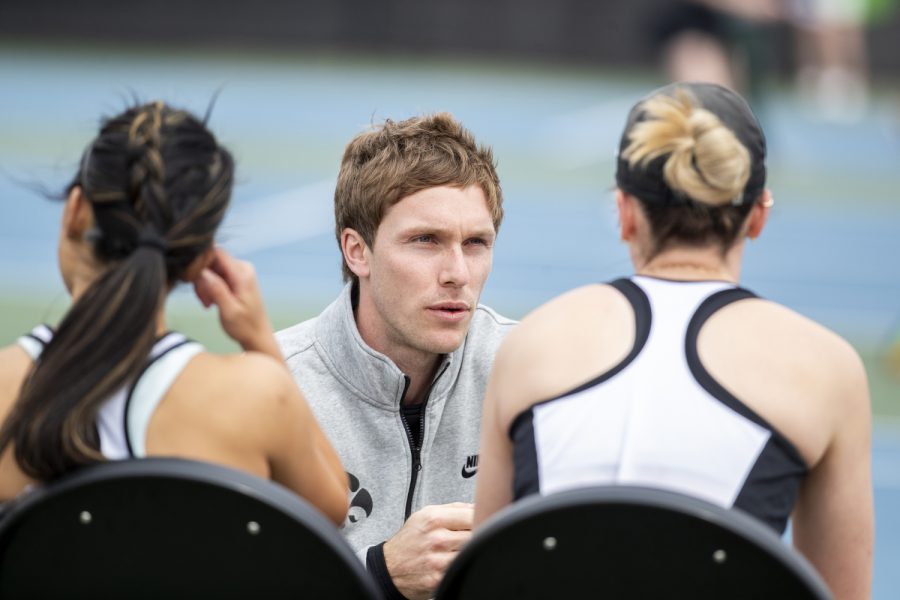Iowa women’s tennis coaches reflect on worldwide recruiting approach
The Iowa women’s tennis coaches approach their recruiting with an emphasis on honesty and determination — looking not only for skill, but personality that builds a team culture.
Assistant coach Daniel Leitner consults with players before doubles during a women’s tennis match between Iowa and Michigan State at the Hawkeye Tennis & Recreation Complex on Wednesday, April 27, 2022. The Hawkeyes defeated the Spartans, 4- 3.
September 20, 2022
Every head coach needs an assistant. For Iowa women tennis’ Sasha Schmid, her assistant coach provides services not just on the court, but on train station platforms in Germany.
When the pair were in Germany, assistant coach Daniel Lietner — who speaks German — negotiated a carpool with a family after all the trains were canceled one night. His heroics helped get the pair of coaches to their next destination — and more importantly — to their next recruit.
Both Schmid and Leitner have a variety of recruiting experiences, traveling across the world and meeting new families in the process. Their respective journeys highlight recruiting’s importance not only in building culture, but also in forging personal connections that last long past commitments.
“I think we definitely always want to take players and, as coaches, have them improve,” Schmid said. “I think that we take a lot of pride in being a developmental program. With that being said, sometimes you can’t make up enough ground during a career; you just need to start with more talent.”
Schmid said even though part of recruiting is about finding physical skills, mental and social disposition is also emphasized. She said she looks for players who are productive in a group setting, who persevere through adversity, and most of all who are happy and enjoyable to be around.
For Leitner, finding such a player requires vigilance. He learned this approach from his time as an assistant coach for the Middle Tennessee State men’s tennis team. Under head coach Jimmy Borendame, the Blue Raiders reached No. 25 in the national recruiting rankings in 2016.
“You can’t leave any stones unturned,” Leitner said. “He was always the first guy there, the last one to leave. Any possible lead was chased down, called Person X whether they knew the next person, for the next person just to get in contact with a kid.”
Chasing leads can also include some trips overseas. Leitner described how he once went to seven European countries over a six-day recruiting trip. When recruiting internationally, Leitner said there are more layers involved.
These layers include explaining the difference between a Power Five and lower-level Division I school, the definition of a conference, the details of amateurism, and obtaining a visa. To find these players, Leitner said he will go through the international tennis rankings and reach out via social media. Before visiting freshmen Daianne Hayashida and Pia Kranholdt, who are from Peru and Germany, respectively, Leitner communicated with the two through FaceTime.
In a worldwide search, Schmid said the recruiting process never really ends. A perfect recruit can spring out of thin air but can also commit to another school just as fast.
“Sometimes you have really tough stretches where you either aren’t finding the right fit or you find the right fit and they choose a different school,” Schmid said. “For me, it’s an emotional roller coaster. So you just have to cast a really broad net and look at all options.”
For Schmid, this emotional turbulence is created through the intimate nature of recruiting. Over a process that can take up to two years, recruiting keeps coaches and players in constant contact. When the time comes for a player to commit to a school, the emotions emerge from both sides.
“You really do get close. You do a home visit, you get to know their family,” Schmid said. “It’s heartbreaking, and I think it’s heartbreaking for them to call. Many players will say that the hardest thing they have to do is call the coaches and tell them they chose another school.”
Both coaches said such close connections require honesty and transparency. Leitner detailed how it is ineffective to just be a “salesman” and not tell the truth to recruits. After five years of coaching together, the two know how they want to build their program moving forward.
“I’m not going to change my wording or promise things we can’t offer,” Leitner said. “At the end of the day it’s just, ‘This is what it is.’ If you want to nitpick you always can, but I think with kids we have on the team now … none of them we had to convince.”



